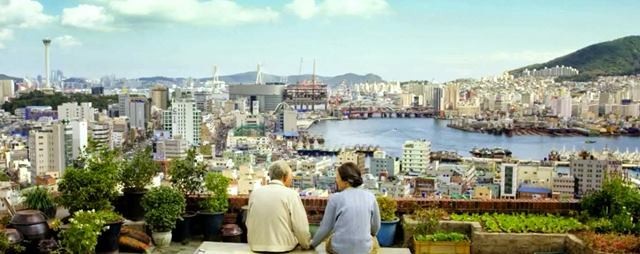
By Jae-Ha Kim
Substack
October 23, 2016
☆☆☆☆
Yoon Deok-Su (played by Hwang Jung-Min)
Young-Ja (Yunjin Kim)
My father was just 17 when he became the primary breadwinner for his family. When he was sent away to fight in the front lines during the Korean War, his younger brothers tearfully begged to go with him, saying they would rather die with him, than to survive on their own. When a neighbor, who was being forced to turn in communists, pointed his finger at my father — who wasn’t a communist — my father forgave him.
My smart, talented and industrious father gave up dreams of going to medical school in Tokyo — something that would’ve benefited him in the long run. But in the short run, who would take care of his parents and younger siblings while he was away?
Some people make choices. Others, like my father, were bound by duty to tackle responsibilities that would have crumpled others.
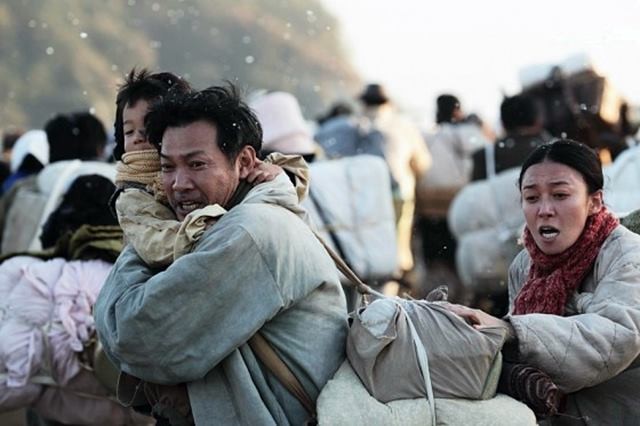
In a review that ran in the New York Times, film critic Jeannette Catsoulis gave “Ode to My Father” a big thumbs down for being “syrupy” and for having “packaged pain … likely to leave Western audiences cold.”
While there is no doubt that director Yoo Je-Kyoon would’ve loved for American audiences to embrace his movie, it’s also undeniable that this film was not made with Western moviegoers in mind.
It was made for Koreans.
It wasn’t until I was older that my parents shared with me some of the horrors they lived through during the Korean War, and I can assure Ms. Catsoulis that the “packaged pain” she complains about was all too real. Perhaps she believes it isn’t plausible that the protagonist would give up the opportunity to better his future and that the life he led is worth an “eye roll”; or that the heartbreaking televised reunions between families torn apart by the Korean War are melodramatic. (She might want to read her own paper’s coverage of how Korean families were separated after the Korean Peninsula was divided.)
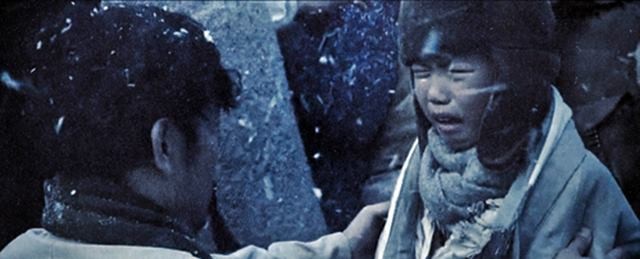
The core of the film deals with loss. During the Hungnam Evacuation in the Korean War, Deok-Su is told by his parents that he has to make sure that his baby sister remains with him. Just a child himself, he loses her. Along with his mother and two of his siblings, he is rescued by a U.S. naval carrier. But the family is separated from his father and baby sister.
This loss will haunt him for the rest of his life, as he tries to fulfill the promise he made to his father: that as the oldest son, he will take care of his mother and siblings.
Near the end of the film, Deok-Su tells his wife that he is glad that it was them who suffered so that their children could have easier, better lives. That sentiment was shared by my parents and much of their generation, who in many ways gave up their lives to ensure our future.
Art is often made to be accessible to the general public and, when it isn’t, it can come across as exclusionary. But for me, “Ode to My Father” is something familiar that evokes memories of sadness, happiness and hope.
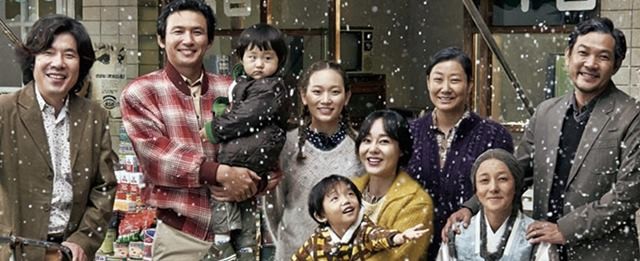

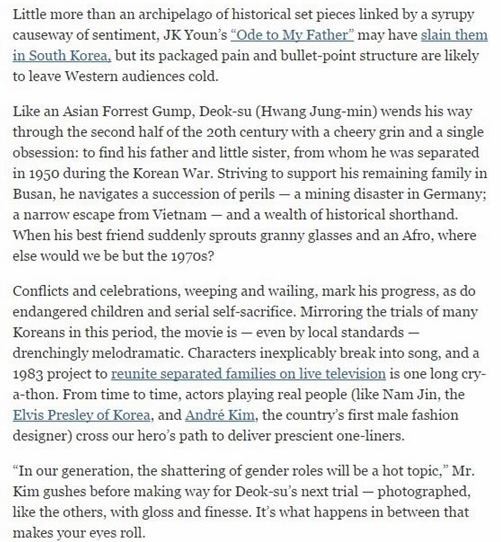
Film release date: December 14, 2014. As of this writing, “Ode to My Father” is the second highest grossing Korean film, behind “The Admiral: Roaring Currents” (“명량”).
Spoiler alert:
Deuk-su never sees his father again. However, he later learns that his baby sister was sent to an orphanage after being separated from her family. She was later adopted by an American family. Deuk-su gets some peace of mind when he is able to reunite her with their mother. Casting directors for the film reached out to Korean American actress Stella Choe to play the grown-up version of the sister. How’d they find her? They saw her viral Youtube video, “What Kind of Asian are You“?
“Ode to My Father” isn’t without its flaws (the rescue scene in the German mine, for instance, was implausible). And I went into nitpicking mode when the long-lost sister was able to not only remember, but repeat her brother’s last words to her … in nearly perfect Korean. As an adoptee who didn’t grow up speaking Korean, she would not have been able to execute this nearly impossible feat.
Ethnocentric reviews:
What rubbed me the wrong way about this NYT review is that it was too quick to dismiss things the critic didn’t understand. It reminded me a bit of how this NPR book critic dismissed a Korean novel as “kimchee-scented Kleenex fiction.”
Of course, Catsoulis’ review was nowhere near as offensive as Rex Reed’s critique of the South Korean hit, “Oldboy,” in the New York Observer. I was surprised at his review for two reasons:
- Honestly, I hadn’t realized that Reed was still alive.
- His vitriol was over-the-top, even for him.
Reed didn’t like “Oldboy,” which is his right, of course. But — like the NPR reviewer who didn’t enjoy “Please Look After Mom” — Reed’s critique took a stab at kimchi, of all things.
He dismissed the film as being trash, because, after all, Korea couldn’t possibly produce a worthy movie. He wrote, “What else can you expect from a nation weaned on kimchi, a mixture of raw garlic and cabbage buried underground until it rots, dug up from the grave and then served in earthenware pots sold at the Seoul airport as souvenirs?”
It’s one thing to be bitchy in an effort to be clever. But it’s low, Low, LOW to try to malign kimchi. Maybe if he ate some of it, he wouldn’t look a decade older than he actually is. (As of this writing, Reed is 78.)
© 2016 JAE-HA KIM | All Rights Reserved
Man, I caught the end of that movie on TV one night, could barely follow the dialogue and I was still bawling like a baby. Packaged pain? Come on. It’s about have basic empathy for the struggles of other people even if you can’t relate to their experiences.
Both I, as a foreigner without that experience in my family and my husband, as a Korean too young to have seen most of what is shown, found it a bit ‘worthy’ in places. BUT, it did a great job of showing the kinds of awful choices people were faced with, and my god, the scenes of the reunions may have been overwrought but how could they be anything else??! Its tone may have felt a little cheesy occasionally, but both of us still thought it was well worth seeing
Completely agree.
I am married to a Korean so I may be subconsciously biased, but I LOVE that movie. Too bad Ms Catsoulis missed the beauty of it.
I thought it was a great movie and cried my eyes out. My parents and many of their friends watched it, and the realities of it deeply resonated with them.
South and North Korean Families, Separated by War 65 Years Ago, Reunite Briefly
By CHOE SANG-HUN
New York Times
OCT. 20, 2015
SEOUL, South Korea — As the husband she last saw 65 years ago hugged her on Tuesday, Lee Soon-kyu, an 85-year-old grandmother from South Korea, smiled shyly, like the young bride she once was.
Ms. Lee had been married to Oh In-se for only seven months and was five months pregnant when the Korean War erupted in 1950. Mr. Oh disappeared into the conflict, ending up in the North when the war was halted three years later by a truce that left the Korean Peninsula divided.
The spouses did not see each other again until Mr. Oh, now a deeply wrinkled 83-year-old, showed up wearing a black fedora as part of the first reunions of war-separated relatives the rival Koreas have arranged in nearly two years.
“I can’t tell how much I missed you,” said Ms. Lee, who never remarried and raised her son alone. “I have wept so much thinking of us that there are no tears left in me.”
Mr. Oh, holding her hand, said, “My dear, I didn’t know that the war would do this to us.”
Ms. Lee and the couple’s son, Oh Jang-gyun, 64, were among 389 South Koreans who crossed the heavily armed border into the North in buses and ambulances on Tuesday to meet with 96 elderly North Koreans who wanted to reunite with long-lost relatives for perhaps the only time. Ms. Lee said that after her husband appeared to her in a dream in 1978, she gave him up for dead and began holding an annual ritual for a deceased relative.
The biggest surprise in her life came after the Koreas agreed in September to hold a new round of family reunions and she heard from the South Korean Red Cross that her husband was alive in the North, looking for her. Since then, she had been busy preparing for their meeting, digging up an old wedding photograph and buying a wristwatch as a gift. The couple’s names are inscribed on the back.
Their time was to be painfully brief. They were granted permission to be together for only 12 hours, in group and private sessions, until Thursday, when they will have to part again. On Thursday, an additional 90 elderly South Koreans will cross the border for another round of three-day reunions with 188 relatives in the North.
The reunions, at the Diamond Mountain resort in southeastern North Korea, are a rare but highly emotional glimpse at the pain the long political divide on the peninsula has inflicted on families separated by the war. For more than six decades, they have been forbidden to exchange letters, phone calls or emails, much less to meet. While their governments have arranged occasional reunions, they have been limited to a couple hundred people. The most recent reunions took place in February of last year.
Lee Ok-yeon, 88, declined to hold the hands of her North Korean husband, Chae Hoon-shik, 88, calling that “pointless” after such a long separation, according to reports by South Korean journalists from Diamond Mountain. But her 65-year-old South Korean son, Hee-yang, hugged his father in tears.
“Father, I am your son,” he said.
The hall where the reunions took place echoed with weeping and laughter as siblings hugged one another and graying children buried their tearful faces in the laps of parents who had shown up in wheelchairs, barely recognizing them. A 65-year-old South Korean, Shin Yeon-ja, told her North Korean father, Jong Se-hwan, 87, that his wife was still alive in the South but too weak to make the cross-border journey.
On Tuesday, two elderly South Korean women had to be taken across the border in ambulances so they could reunite with brothers from the North.
South Korea has repeatedly called for more reunions, which are widely viewed as a barometer of relations. But given the fluctuating political tensions on the peninsula, only 18,800 Koreans have been allowed to participate in 19 rounds of face-to-face reunions since 1985, when the first gatherings were held.
More than half of the 66,000 South Koreans waiting for reunions are in their 80s or older. South Korea selects the candidates for reunions by lottery, while the North is believed to give priority to people deemed loyal to the government.
On Tuesday, some visitors from the South carried prewar photographs to help their siblings recognize them. They had also packed photographs of their hometowns and of the grave sites of dead relatives, as well as underwear, medicine, cash and other gifts.
The South Korean delegation’s crossing was delayed briefly when North Korean border guards demanded to hold the laptop computers of South Korean reporters overnight for inspection. The reporters resisted the demand but let the officials search through their computers while they watched.
Foreign reporters were not allowed to cover the event.
‘Please Look After Mom’: A Guilt Trip To The Big City
April 5, 201111:27 AM ET
Heard on Fresh Air
MAUREEN CORRIGAN
Mama Mia, who knew that Koreans outstrip Italians and Jews when it comes to mother guilt!
How else to explain why Please Look After Mom, a new novel by Korean novelist Kyung-sook Shin, has already sold over one-million copies in her native South Korea? This literary phenom is scheduled to be published in 22 other countries and has just come out in the U.S. The back cover of the American edition, brought out by Knopf, is filled with blurbs by heavyweights like Gary Shteyngart and Edwidge Danticat. They, too, must share a weakness for melodramas about maternal self-sacrifice, although Please Look After Mom outsniffles even those immortal weepies of the western canon, Stella Dallas and Mildred Pierce.
To give it its due, Shin’s novel, which was translated from the Korean by Chi-Young Kim, is marked by a wistful tone and by some precisely-rendered scenes of emotional disconnect between a mother and the adult children who’ve grown apart from her. But the weird fascination of Please Look After Mom is its message — completely alien to our own therapeutic culture — that if one’s mother is miserable, it is indeed, the fault of her husband and her ungrateful children. As an American reader — indoctrinated in resolute messages about “boundaries” and “taking responsibility” — I kept waiting for irony; a comic twist in the plot; a reprieve for the breast-beating children. It wasn’t until the end of the novel, when Shin rolled out the Mother of all maternal suffering images — Michaelangelo’s Pieta — that I understood I was stranded in a Korean soap opera decked out as serious literary fiction.
The pretext of Please Look After Mom is that an elderly, illiterate woman is separated from her distracted husband in the central train station in Seoul and goes missing. Her four adult children distribute fliers and roam the city searching for her, but are tormented by regret that none of them went to the train station in the first place to meet their country bumpkin parents. That goes double for the eldest son, a wealthy businessman who was indulging in a sauna during his parents’ arrival time and, extra especially, for the eldest daughter, a successful novelist, who was off having her ego inflated at the Beijing Book Fair. Shin presents her reproachful tale through different narrative perspectives, the most labored of which is a God-like second-person voice. Here, that voice hectors the novelist daughter for her crimes of inattention:
“After you’d left home for the city, you’d always talked to [Mom] as if you were angry at her. You talked back to her saying, “What do you know, Mom?” . . . Even when you had to take a plane because your book was being published in another country, or you had to go abroad for a seminar, when she asked, “Why are you going there?” you stiffly replied, “Because I have business to take care of.”
Did you catch the anti-city, anti-modernist, anti-feminist messages in that passage? The lost mother clearly stands for values that are fading from Korean culture as industrialization and urbanization triumph. Her life, which we glimpse in flashbacks, has been one long ordeal since her marriage at age 17, yet mom has retained her simple humanity. We readers know this because we’re told that mom secretly donated money for years to an orphanage and only asked in return that a worker there read aloud to her the books written by her cold-hearted novelist daughter.
If there’s a literary genre in Korean that translates into “manipulative sob sister melodrama,” Please Look After Mom is surely its reigning queen. I’m mystified as to why this guilt-laden morality tale has become such a sensation in Korea and why a literary house like Knopf would embrace it. (Although, as women are the biggest audience for literary fiction, Please Look After Mom must be anticipated to be a book club hit in this country.) But, why wallow in cross-cultural self-pity, ladies?
Having just read Patti Smith’s award-winning memoir, Just Kids, for the second time, I’d urge you to pick her empowering female adventure tale about getting lost in the city instead. Smith will get your book club on its feet and pumping its collective fists in the air, rather than knocking back the wine and reaching for the cheap consolations of kimchee-scented Kleenex fiction.